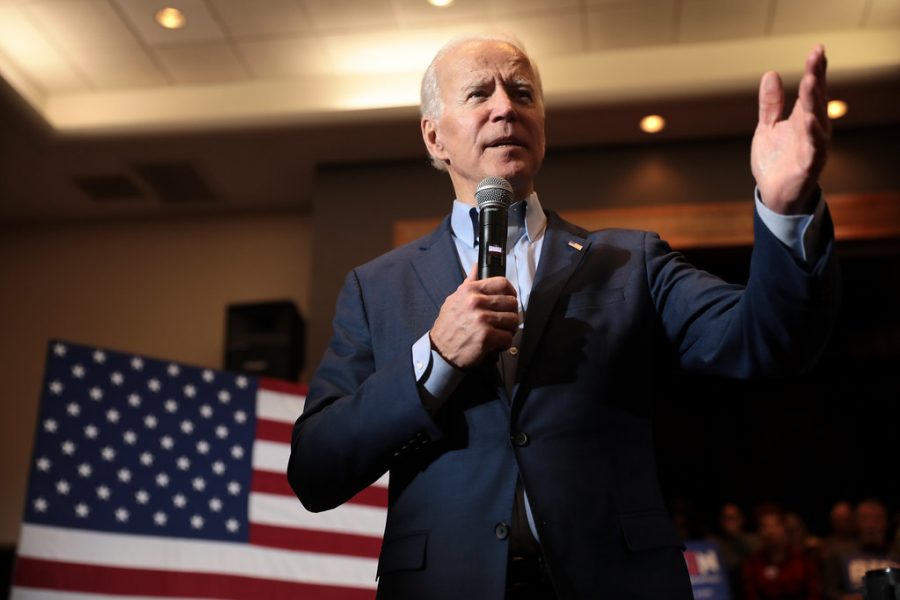Biden focuses on COVID-19, climate change with executive orders
“Joe Biden” by Gage Skidmore is licensed under CC BY-SA 2.0
President Joe Biden wasted no time in getting to work after his Jan. 20 inauguration, focusing largely on relief measures for the coronavirus pandemic and reversing other policies from the Trump administration.
February 19, 2021
Less than 24 hours after becoming the 46th president of the United States, Joe Biden signed 15 executive orders concerning a multitude of issues from the coronavirus pandemic to climate change to racial and gender equality.
President Biden and Vice President Kamala Harris were sworn into office Jan. 20. The inauguration was a historic one, as Harris became the first Black, first Asian American and first woman to hold the office of vice president.
Biden’s first actions after the inauguration were largely an attempt to reverse policies put in place by former President Donald Trump. While the Trump administration did not implement a federal response to the coronavirus pandemic, the Biden administration instituted a mandate to wear masks and practice social distancing on all federal government property.
“With COVID, [change is] very gradual,” said Jackie Baker, a first-year communication studies major. “I’m glad that there’s a mask mandate. That will definitely help.”
Another executive order created the COVID-19 Response Coordinator position. Jeff Zients, who was tapped for the position, is responsible for “[coordinating] all elements of the COVID-19 response,” including treatment, the supply and distribution of personal protective equipment and the expansion of testing.
“I don’t think that his plans are sustainable. And I think that for the benefit, the cost — the immediate cost — is a little too high,” said Nick Santangelo, a second-year political science major. “I think some COVID relief, for now, is good. However, what I would have liked to see personally is a rerouting of funds, not just an extension of funds in general.”
The Biden administration also stopped the process of the United States’ withdrawal from the World Health Organization, or WHO, which formally began last July under the direction of former President Trump. Without Biden’s reversal, the change would have gone into effect July 6, 2021.
Northeastern professor of public policy and director of the public administration and public policy masters programs, Christopher Bosso, said that Biden’s executive orders are largely in response to areas where the country is experiencing crisis.
“[The Biden administration] is basically just saying, ‘Alright, we’re gonna take this disease seriously,’” Bosso said. “[They are] going to use the force of the federal government and resources of the federal government to respond to the threat, to get it under control, to get vaccinations done.”
President Biden has also taken measures to combat the growing environmental crisis, including issues such as environmental injustice, pollution and the use of fossil fuels. The United States is now set to rejoin the 2015 Paris climate agreement from which it officially withdrew in November 2020, three years after Trump announced the decision to do so. The countries that have entered the agreement are committed to combating the threat of climate change by reducing global greenhouse gas emissions.
Biden also revoked the permit granted to the Keystone XL oil pipeline. The pipeline’s history is controversial — it was projected to carry over 800,000 barrels of oil each day from Canada to Nebraska, create jobs and lower energy costs, but it would cut through Indigenous lands and risk spillage and pollution. By revoking the permit, the Biden administration is taking another step away from dependency on fossil fuels.
The Indingenous Environmental Network is one of many organizations that have opposed the pipeline’s construction. They expressed their support for Biden’s revocation of the permit with a tweet:
“We appreciate your commitment to climate justice and to canceling Keystone XL. We call upon you to take the next step toward restoring balance for future generations. Please shut down the Dakota Access Pipeline,” the tweet read.
Others are worried about the revocation. On Feb. 4, South Dakota Gov. Kristi Noem tweeted, “The Keystone XL pipeline brought jobs to our state. Those jobs are gone, devastating individual families and small businesses across South Dakota.”
Other executive orders focused on promoting racial equality, preventing gender and sexuality-based discrimination and revising the enforcement of immigration policies. These executive actions are not permanent if Biden does not work with Congress in order to pass lasting legislation.
In his first 100 days in office, Biden plans to address health care, the economy and police and criminal justice reform.
“Given the narrowness of legislative majorities, it’s gonna be very difficult to get anything transformative passed,” Bosso said. “You’re not going to see a major transformative piece of legislation like the Affordable Care Act, the votes simply are not there. But you might see us getting some tweaks around the edges, maybe on immigration policies where there might be some bipartisan support, maybe on criminal justice reform, where there’s some bipartisan support. It just really depends.”
The Democrats currently have control of the executive branch, the House of Representatives and the Senate. However, the president’s party generally loses seats in the midterm elections, Bosso said, meaning their party could lose control in just two years. If Biden is to fulfill the promises he laid out in his campaign, he must act quickly.







